University Report: MKT01097 Assessment 4 - Management Reflection
VerifiedAdded on 2023/01/20
|8
|1890
|70
Report
AI Summary
This report analyzes a student's reflection on their management skills, focusing on the Competing Values Framework (CVF). The report is based on the student's responses to two surveys, which identified their strengths and weaknesses across the four quadrants of the CVF: collaborate, create, compete, and control. The student discusses their growth, particularly in the control quadrant, and identifies areas for further development, such as the broker role. Part B of the report analyzes a community blog post, exploring the importance of understanding the external environment for modern tourism and hospitality managers. The report references various sources to support its arguments, including the impact of marketing, customer needs, and technological advancements on the tourism and hospitality industries. The report concludes by emphasizing the need for managers to be adaptable, innovative, and aware of external factors to achieve success.
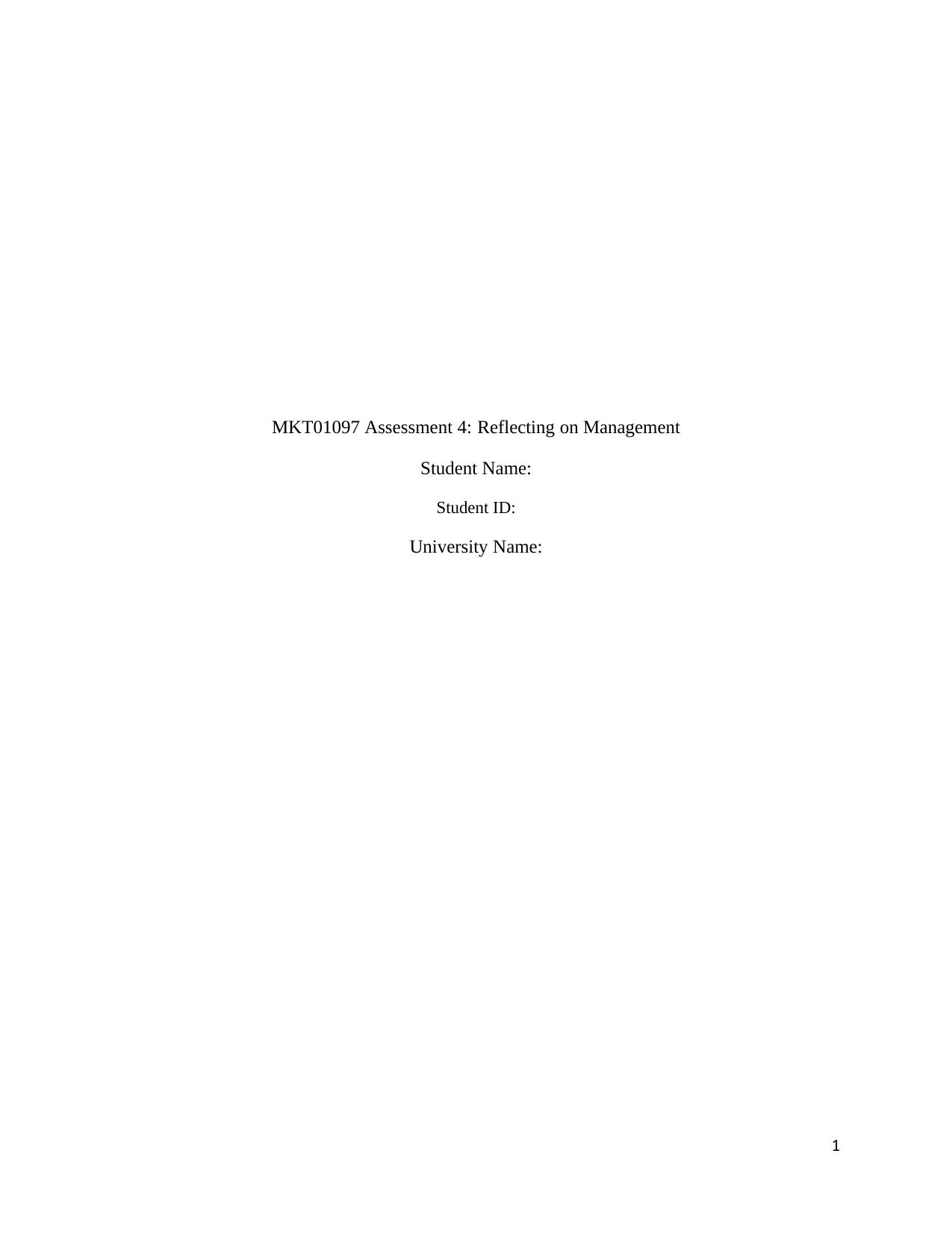
MKT01097 Assessment 4: Reflecting on Management
Student Name:
Student ID:
University Name:
1
Student Name:
Student ID:
University Name:
1
Paraphrase This Document
Need a fresh take? Get an instant paraphrase of this document with our AI Paraphraser
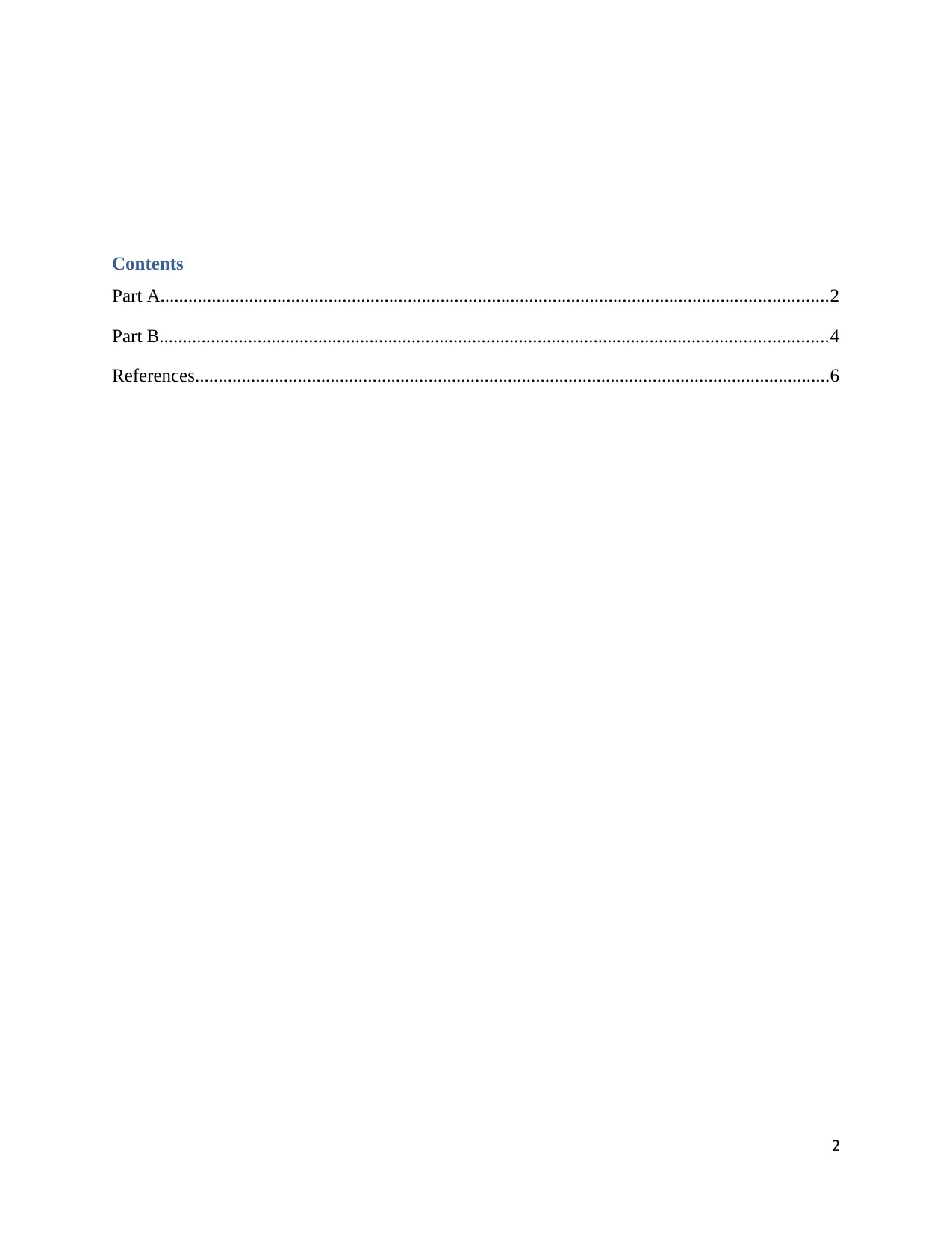
Contents
Part A...............................................................................................................................................2
Part B...............................................................................................................................................4
References........................................................................................................................................6
2
Part A...............................................................................................................................................2
Part B...............................................................................................................................................4
References........................................................................................................................................6
2
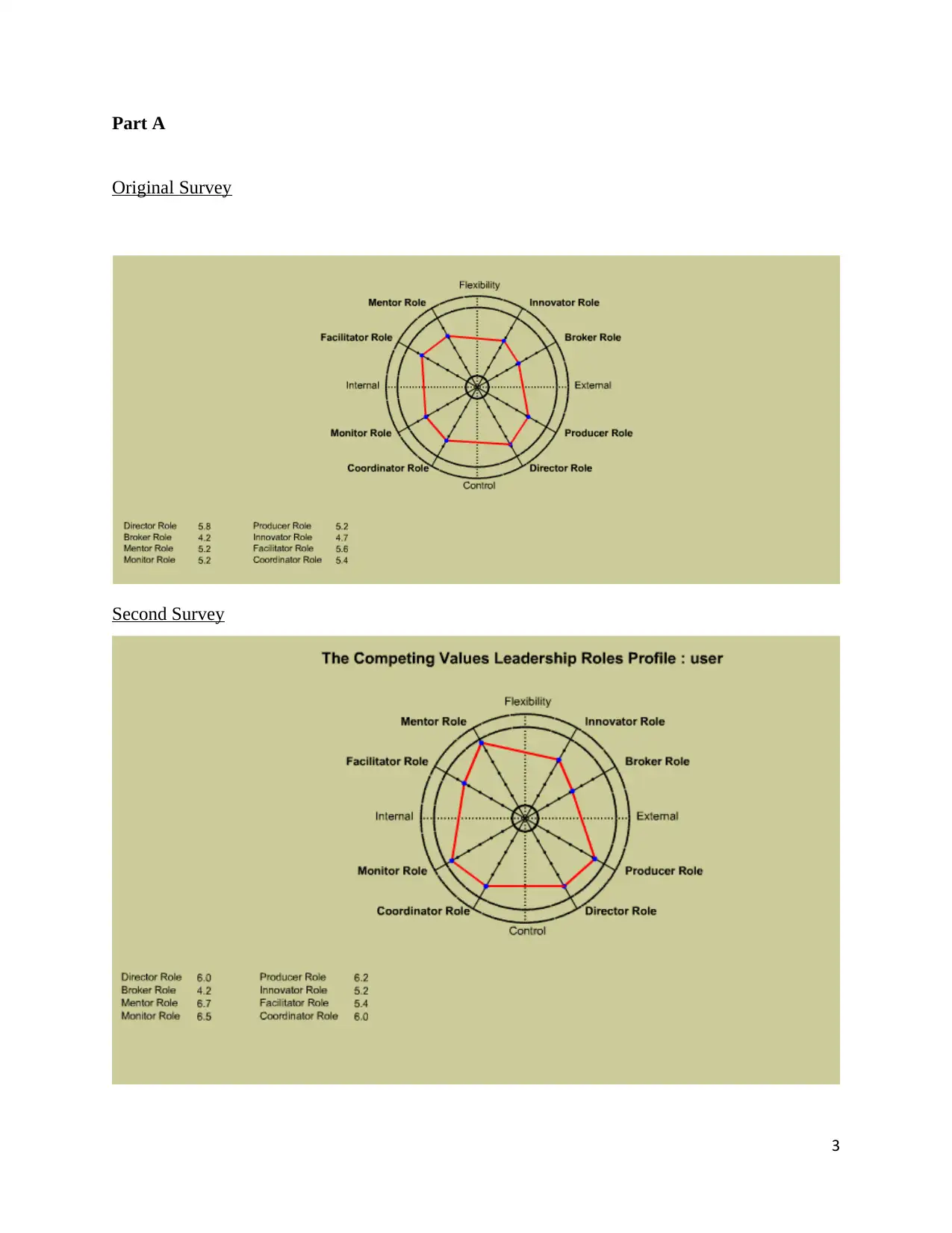
Part A
Original Survey
Second Survey
3
Original Survey
Second Survey
3
⊘ This is a preview!⊘
Do you want full access?
Subscribe today to unlock all pages.

Trusted by 1+ million students worldwide
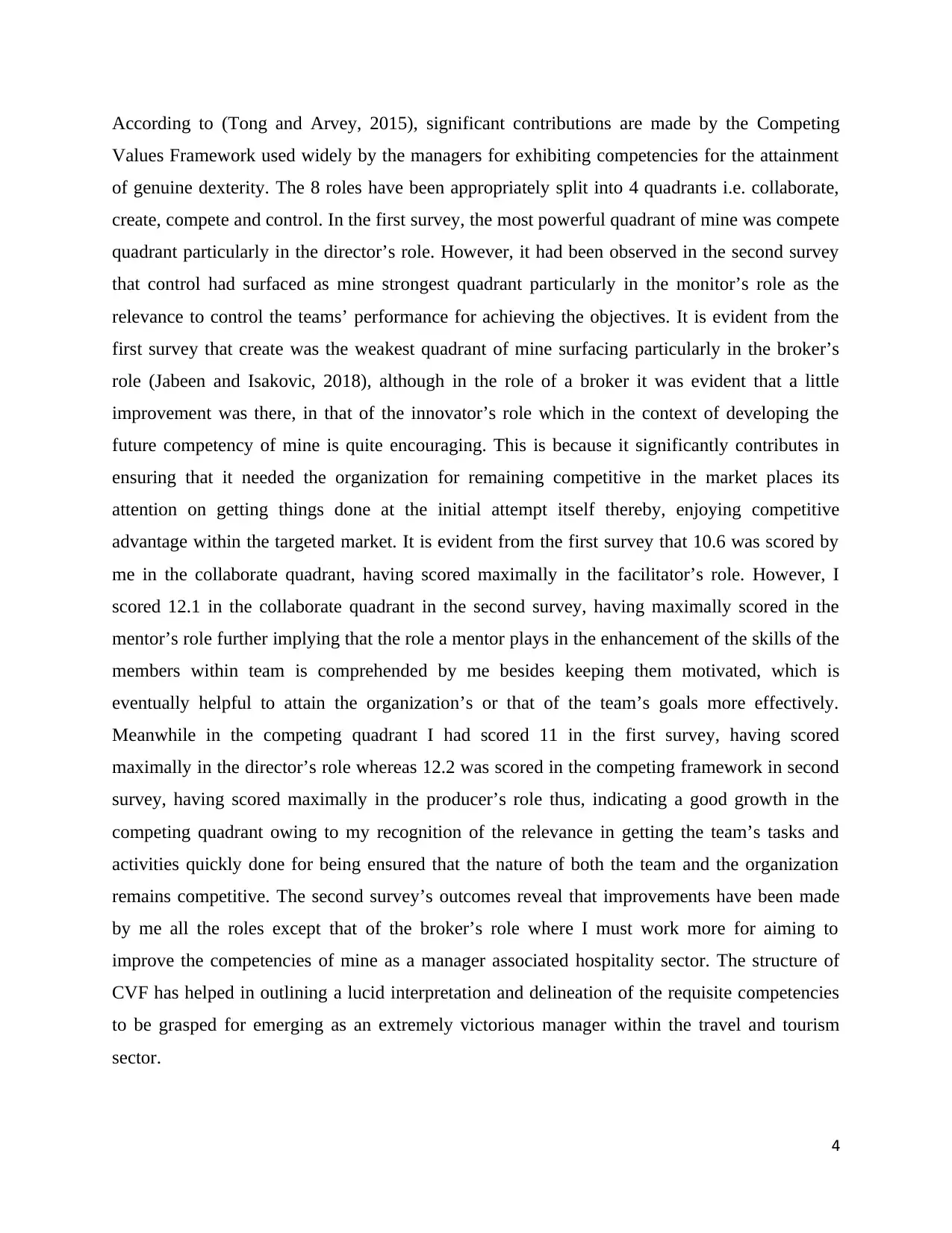
According to (Tong and Arvey, 2015), significant contributions are made by the Competing
Values Framework used widely by the managers for exhibiting competencies for the attainment
of genuine dexterity. The 8 roles have been appropriately split into 4 quadrants i.e. collaborate,
create, compete and control. In the first survey, the most powerful quadrant of mine was compete
quadrant particularly in the director’s role. However, it had been observed in the second survey
that control had surfaced as mine strongest quadrant particularly in the monitor’s role as the
relevance to control the teams’ performance for achieving the objectives. It is evident from the
first survey that create was the weakest quadrant of mine surfacing particularly in the broker’s
role (Jabeen and Isakovic, 2018), although in the role of a broker it was evident that a little
improvement was there, in that of the innovator’s role which in the context of developing the
future competency of mine is quite encouraging. This is because it significantly contributes in
ensuring that it needed the organization for remaining competitive in the market places its
attention on getting things done at the initial attempt itself thereby, enjoying competitive
advantage within the targeted market. It is evident from the first survey that 10.6 was scored by
me in the collaborate quadrant, having scored maximally in the facilitator’s role. However, I
scored 12.1 in the collaborate quadrant in the second survey, having maximally scored in the
mentor’s role further implying that the role a mentor plays in the enhancement of the skills of the
members within team is comprehended by me besides keeping them motivated, which is
eventually helpful to attain the organization’s or that of the team’s goals more effectively.
Meanwhile in the competing quadrant I had scored 11 in the first survey, having scored
maximally in the director’s role whereas 12.2 was scored in the competing framework in second
survey, having scored maximally in the producer’s role thus, indicating a good growth in the
competing quadrant owing to my recognition of the relevance in getting the team’s tasks and
activities quickly done for being ensured that the nature of both the team and the organization
remains competitive. The second survey’s outcomes reveal that improvements have been made
by me all the roles except that of the broker’s role where I must work more for aiming to
improve the competencies of mine as a manager associated hospitality sector. The structure of
CVF has helped in outlining a lucid interpretation and delineation of the requisite competencies
to be grasped for emerging as an extremely victorious manager within the travel and tourism
sector.
4
Values Framework used widely by the managers for exhibiting competencies for the attainment
of genuine dexterity. The 8 roles have been appropriately split into 4 quadrants i.e. collaborate,
create, compete and control. In the first survey, the most powerful quadrant of mine was compete
quadrant particularly in the director’s role. However, it had been observed in the second survey
that control had surfaced as mine strongest quadrant particularly in the monitor’s role as the
relevance to control the teams’ performance for achieving the objectives. It is evident from the
first survey that create was the weakest quadrant of mine surfacing particularly in the broker’s
role (Jabeen and Isakovic, 2018), although in the role of a broker it was evident that a little
improvement was there, in that of the innovator’s role which in the context of developing the
future competency of mine is quite encouraging. This is because it significantly contributes in
ensuring that it needed the organization for remaining competitive in the market places its
attention on getting things done at the initial attempt itself thereby, enjoying competitive
advantage within the targeted market. It is evident from the first survey that 10.6 was scored by
me in the collaborate quadrant, having scored maximally in the facilitator’s role. However, I
scored 12.1 in the collaborate quadrant in the second survey, having maximally scored in the
mentor’s role further implying that the role a mentor plays in the enhancement of the skills of the
members within team is comprehended by me besides keeping them motivated, which is
eventually helpful to attain the organization’s or that of the team’s goals more effectively.
Meanwhile in the competing quadrant I had scored 11 in the first survey, having scored
maximally in the director’s role whereas 12.2 was scored in the competing framework in second
survey, having scored maximally in the producer’s role thus, indicating a good growth in the
competing quadrant owing to my recognition of the relevance in getting the team’s tasks and
activities quickly done for being ensured that the nature of both the team and the organization
remains competitive. The second survey’s outcomes reveal that improvements have been made
by me all the roles except that of the broker’s role where I must work more for aiming to
improve the competencies of mine as a manager associated hospitality sector. The structure of
CVF has helped in outlining a lucid interpretation and delineation of the requisite competencies
to be grasped for emerging as an extremely victorious manager within the travel and tourism
sector.
4
Paraphrase This Document
Need a fresh take? Get an instant paraphrase of this document with our AI Paraphraser
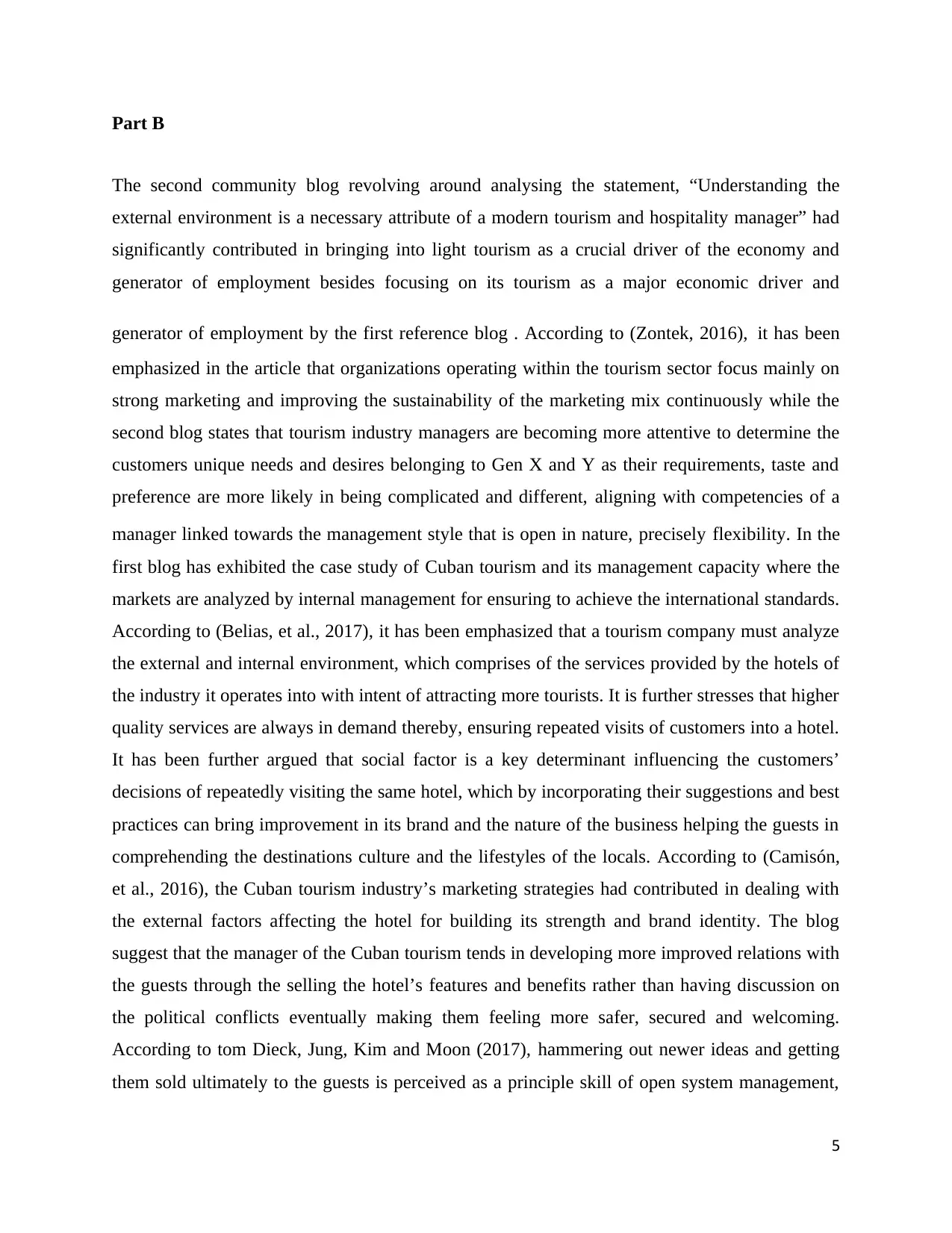
Part B
The second community blog revolving around analysing the statement, “Understanding the
external environment is a necessary attribute of a modern tourism and hospitality manager” had
significantly contributed in bringing into light tourism as a crucial driver of the economy and
generator of employment besides focusing on its tourism as a major economic driver and
generator of employment by the first reference blog . According to (Zontek, 2016), it has been
emphasized in the article that organizations operating within the tourism sector focus mainly on
strong marketing and improving the sustainability of the marketing mix continuously while the
second blog states that tourism industry managers are becoming more attentive to determine the
customers unique needs and desires belonging to Gen X and Y as their requirements, taste and
preference are more likely in being complicated and different, aligning with competencies of a
manager linked towards the management style that is open in nature, precisely flexibility. In the
first blog has exhibited the case study of Cuban tourism and its management capacity where the
markets are analyzed by internal management for ensuring to achieve the international standards.
According to (Belias, et al., 2017), it has been emphasized that a tourism company must analyze
the external and internal environment, which comprises of the services provided by the hotels of
the industry it operates into with intent of attracting more tourists. It is further stresses that higher
quality services are always in demand thereby, ensuring repeated visits of customers into a hotel.
It has been further argued that social factor is a key determinant influencing the customers’
decisions of repeatedly visiting the same hotel, which by incorporating their suggestions and best
practices can bring improvement in its brand and the nature of the business helping the guests in
comprehending the destinations culture and the lifestyles of the locals. According to (Camisón,
et al., 2016), the Cuban tourism industry’s marketing strategies had contributed in dealing with
the external factors affecting the hotel for building its strength and brand identity. The blog
suggest that the manager of the Cuban tourism tends in developing more improved relations with
the guests through the selling the hotel’s features and benefits rather than having discussion on
the political conflicts eventually making them feeling more safer, secured and welcoming.
According to tom Dieck, Jung, Kim and Moon (2017), hammering out newer ideas and getting
them sold ultimately to the guests is perceived as a principle skill of open system management,
5
The second community blog revolving around analysing the statement, “Understanding the
external environment is a necessary attribute of a modern tourism and hospitality manager” had
significantly contributed in bringing into light tourism as a crucial driver of the economy and
generator of employment besides focusing on its tourism as a major economic driver and
generator of employment by the first reference blog . According to (Zontek, 2016), it has been
emphasized in the article that organizations operating within the tourism sector focus mainly on
strong marketing and improving the sustainability of the marketing mix continuously while the
second blog states that tourism industry managers are becoming more attentive to determine the
customers unique needs and desires belonging to Gen X and Y as their requirements, taste and
preference are more likely in being complicated and different, aligning with competencies of a
manager linked towards the management style that is open in nature, precisely flexibility. In the
first blog has exhibited the case study of Cuban tourism and its management capacity where the
markets are analyzed by internal management for ensuring to achieve the international standards.
According to (Belias, et al., 2017), it has been emphasized that a tourism company must analyze
the external and internal environment, which comprises of the services provided by the hotels of
the industry it operates into with intent of attracting more tourists. It is further stresses that higher
quality services are always in demand thereby, ensuring repeated visits of customers into a hotel.
It has been further argued that social factor is a key determinant influencing the customers’
decisions of repeatedly visiting the same hotel, which by incorporating their suggestions and best
practices can bring improvement in its brand and the nature of the business helping the guests in
comprehending the destinations culture and the lifestyles of the locals. According to (Camisón,
et al., 2016), the Cuban tourism industry’s marketing strategies had contributed in dealing with
the external factors affecting the hotel for building its strength and brand identity. The blog
suggest that the manager of the Cuban tourism tends in developing more improved relations with
the guests through the selling the hotel’s features and benefits rather than having discussion on
the political conflicts eventually making them feeling more safer, secured and welcoming.
According to tom Dieck, Jung, Kim and Moon (2017), hammering out newer ideas and getting
them sold ultimately to the guests is perceived as a principle skill of open system management,
5
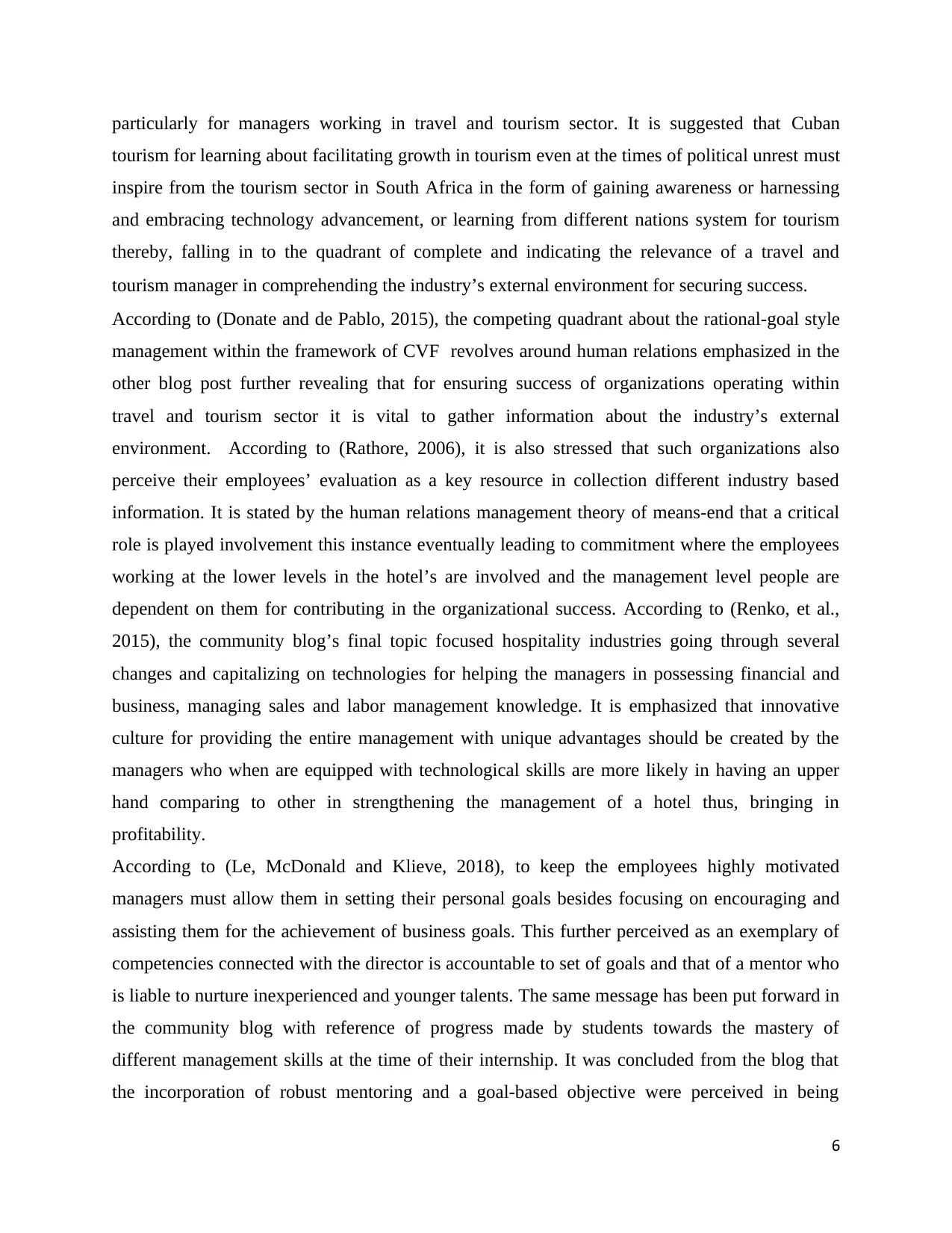
particularly for managers working in travel and tourism sector. It is suggested that Cuban
tourism for learning about facilitating growth in tourism even at the times of political unrest must
inspire from the tourism sector in South Africa in the form of gaining awareness or harnessing
and embracing technology advancement, or learning from different nations system for tourism
thereby, falling in to the quadrant of complete and indicating the relevance of a travel and
tourism manager in comprehending the industry’s external environment for securing success.
According to (Donate and de Pablo, 2015), the competing quadrant about the rational-goal style
management within the framework of CVF revolves around human relations emphasized in the
other blog post further revealing that for ensuring success of organizations operating within
travel and tourism sector it is vital to gather information about the industry’s external
environment. According to (Rathore, 2006), it is also stressed that such organizations also
perceive their employees’ evaluation as a key resource in collection different industry based
information. It is stated by the human relations management theory of means-end that a critical
role is played involvement this instance eventually leading to commitment where the employees
working at the lower levels in the hotel’s are involved and the management level people are
dependent on them for contributing in the organizational success. According to (Renko, et al.,
2015), the community blog’s final topic focused hospitality industries going through several
changes and capitalizing on technologies for helping the managers in possessing financial and
business, managing sales and labor management knowledge. It is emphasized that innovative
culture for providing the entire management with unique advantages should be created by the
managers who when are equipped with technological skills are more likely in having an upper
hand comparing to other in strengthening the management of a hotel thus, bringing in
profitability.
According to (Le, McDonald and Klieve, 2018), to keep the employees highly motivated
managers must allow them in setting their personal goals besides focusing on encouraging and
assisting them for the achievement of business goals. This further perceived as an exemplary of
competencies connected with the director is accountable to set of goals and that of a mentor who
is liable to nurture inexperienced and younger talents. The same message has been put forward in
the community blog with reference of progress made by students towards the mastery of
different management skills at the time of their internship. It was concluded from the blog that
the incorporation of robust mentoring and a goal-based objective were perceived in being
6
tourism for learning about facilitating growth in tourism even at the times of political unrest must
inspire from the tourism sector in South Africa in the form of gaining awareness or harnessing
and embracing technology advancement, or learning from different nations system for tourism
thereby, falling in to the quadrant of complete and indicating the relevance of a travel and
tourism manager in comprehending the industry’s external environment for securing success.
According to (Donate and de Pablo, 2015), the competing quadrant about the rational-goal style
management within the framework of CVF revolves around human relations emphasized in the
other blog post further revealing that for ensuring success of organizations operating within
travel and tourism sector it is vital to gather information about the industry’s external
environment. According to (Rathore, 2006), it is also stressed that such organizations also
perceive their employees’ evaluation as a key resource in collection different industry based
information. It is stated by the human relations management theory of means-end that a critical
role is played involvement this instance eventually leading to commitment where the employees
working at the lower levels in the hotel’s are involved and the management level people are
dependent on them for contributing in the organizational success. According to (Renko, et al.,
2015), the community blog’s final topic focused hospitality industries going through several
changes and capitalizing on technologies for helping the managers in possessing financial and
business, managing sales and labor management knowledge. It is emphasized that innovative
culture for providing the entire management with unique advantages should be created by the
managers who when are equipped with technological skills are more likely in having an upper
hand comparing to other in strengthening the management of a hotel thus, bringing in
profitability.
According to (Le, McDonald and Klieve, 2018), to keep the employees highly motivated
managers must allow them in setting their personal goals besides focusing on encouraging and
assisting them for the achievement of business goals. This further perceived as an exemplary of
competencies connected with the director is accountable to set of goals and that of a mentor who
is liable to nurture inexperienced and younger talents. The same message has been put forward in
the community blog with reference of progress made by students towards the mastery of
different management skills at the time of their internship. It was concluded from the blog that
the incorporation of robust mentoring and a goal-based objective were perceived in being
6
⊘ This is a preview!⊘
Do you want full access?
Subscribe today to unlock all pages.

Trusted by 1+ million students worldwide
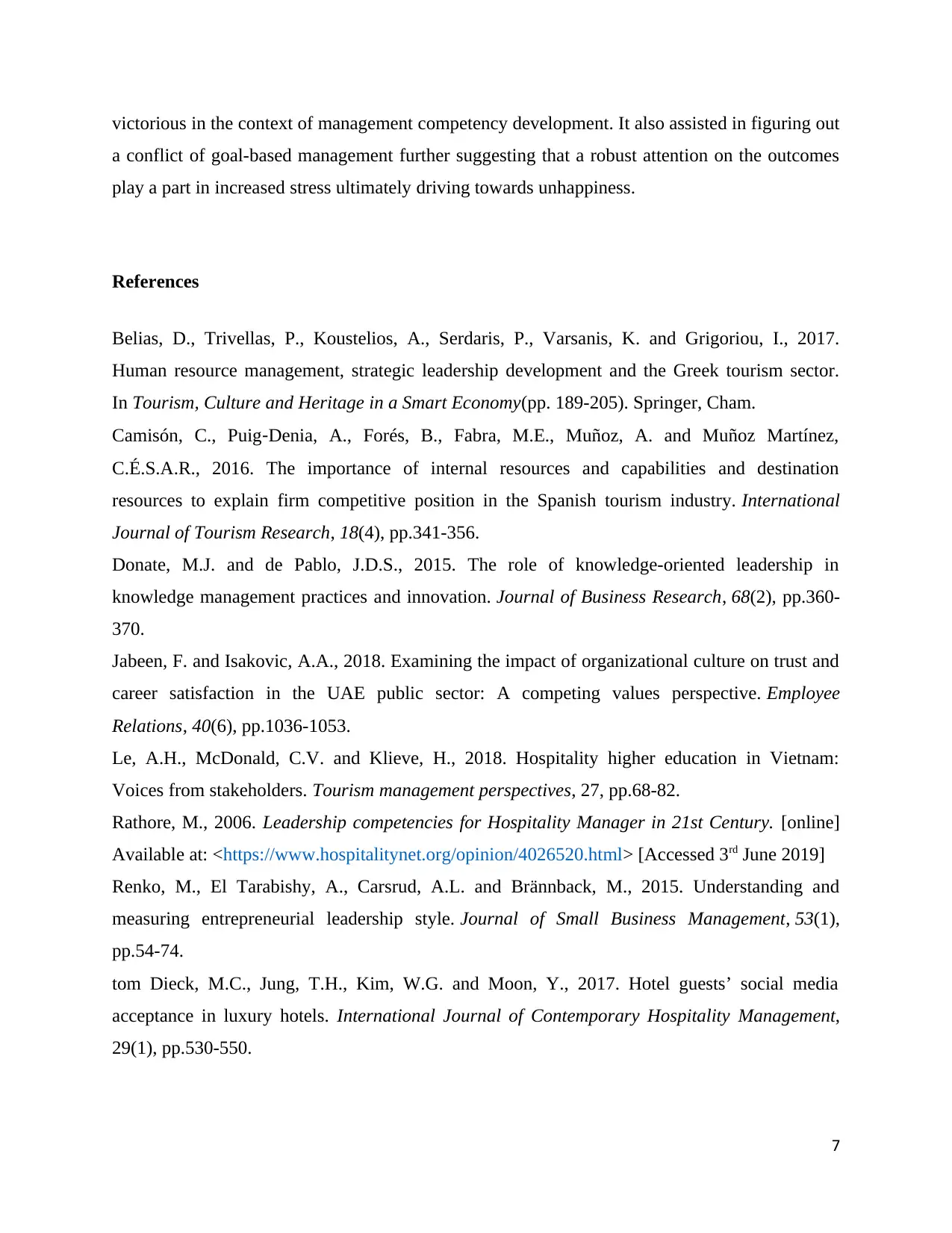
victorious in the context of management competency development. It also assisted in figuring out
a conflict of goal-based management further suggesting that a robust attention on the outcomes
play a part in increased stress ultimately driving towards unhappiness.
References
Belias, D., Trivellas, P., Koustelios, A., Serdaris, P., Varsanis, K. and Grigoriou, I., 2017.
Human resource management, strategic leadership development and the Greek tourism sector.
In Tourism, Culture and Heritage in a Smart Economy(pp. 189-205). Springer, Cham.
Camisón, C., Puig‐Denia, A., Forés, B., Fabra, M.E., Muñoz, A. and Muñoz Martínez,
C.É.S.A.R., 2016. The importance of internal resources and capabilities and destination
resources to explain firm competitive position in the Spanish tourism industry. International
Journal of Tourism Research, 18(4), pp.341-356.
Donate, M.J. and de Pablo, J.D.S., 2015. The role of knowledge-oriented leadership in
knowledge management practices and innovation. Journal of Business Research, 68(2), pp.360-
370.
Jabeen, F. and Isakovic, A.A., 2018. Examining the impact of organizational culture on trust and
career satisfaction in the UAE public sector: A competing values perspective. Employee
Relations, 40(6), pp.1036-1053.
Le, A.H., McDonald, C.V. and Klieve, H., 2018. Hospitality higher education in Vietnam:
Voices from stakeholders. Tourism management perspectives, 27, pp.68-82.
Rathore, M., 2006. Leadership competencies for Hospitality Manager in 21st Century. [online]
Available at: <https://www.hospitalitynet.org/opinion/4026520.html> [Accessed 3rd June 2019]
Renko, M., El Tarabishy, A., Carsrud, A.L. and Brännback, M., 2015. Understanding and
measuring entrepreneurial leadership style. Journal of Small Business Management, 53(1),
pp.54-74.
tom Dieck, M.C., Jung, T.H., Kim, W.G. and Moon, Y., 2017. Hotel guests’ social media
acceptance in luxury hotels. International Journal of Contemporary Hospitality Management,
29(1), pp.530-550.
7
a conflict of goal-based management further suggesting that a robust attention on the outcomes
play a part in increased stress ultimately driving towards unhappiness.
References
Belias, D., Trivellas, P., Koustelios, A., Serdaris, P., Varsanis, K. and Grigoriou, I., 2017.
Human resource management, strategic leadership development and the Greek tourism sector.
In Tourism, Culture and Heritage in a Smart Economy(pp. 189-205). Springer, Cham.
Camisón, C., Puig‐Denia, A., Forés, B., Fabra, M.E., Muñoz, A. and Muñoz Martínez,
C.É.S.A.R., 2016. The importance of internal resources and capabilities and destination
resources to explain firm competitive position in the Spanish tourism industry. International
Journal of Tourism Research, 18(4), pp.341-356.
Donate, M.J. and de Pablo, J.D.S., 2015. The role of knowledge-oriented leadership in
knowledge management practices and innovation. Journal of Business Research, 68(2), pp.360-
370.
Jabeen, F. and Isakovic, A.A., 2018. Examining the impact of organizational culture on trust and
career satisfaction in the UAE public sector: A competing values perspective. Employee
Relations, 40(6), pp.1036-1053.
Le, A.H., McDonald, C.V. and Klieve, H., 2018. Hospitality higher education in Vietnam:
Voices from stakeholders. Tourism management perspectives, 27, pp.68-82.
Rathore, M., 2006. Leadership competencies for Hospitality Manager in 21st Century. [online]
Available at: <https://www.hospitalitynet.org/opinion/4026520.html> [Accessed 3rd June 2019]
Renko, M., El Tarabishy, A., Carsrud, A.L. and Brännback, M., 2015. Understanding and
measuring entrepreneurial leadership style. Journal of Small Business Management, 53(1),
pp.54-74.
tom Dieck, M.C., Jung, T.H., Kim, W.G. and Moon, Y., 2017. Hotel guests’ social media
acceptance in luxury hotels. International Journal of Contemporary Hospitality Management,
29(1), pp.530-550.
7
Paraphrase This Document
Need a fresh take? Get an instant paraphrase of this document with our AI Paraphraser
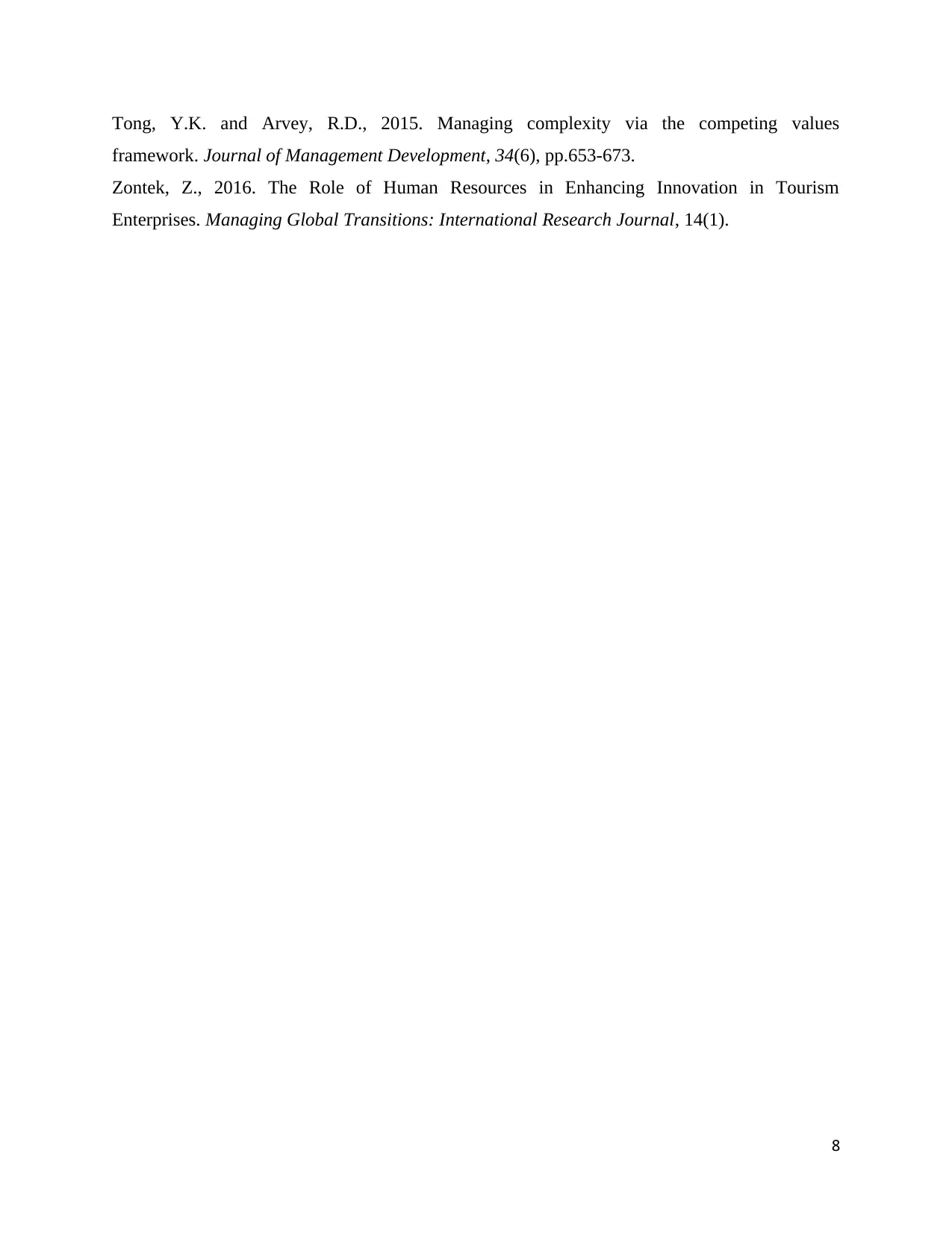
Tong, Y.K. and Arvey, R.D., 2015. Managing complexity via the competing values
framework. Journal of Management Development, 34(6), pp.653-673.
Zontek, Z., 2016. The Role of Human Resources in Enhancing Innovation in Tourism
Enterprises. Managing Global Transitions: International Research Journal, 14(1).
8
framework. Journal of Management Development, 34(6), pp.653-673.
Zontek, Z., 2016. The Role of Human Resources in Enhancing Innovation in Tourism
Enterprises. Managing Global Transitions: International Research Journal, 14(1).
8
1 out of 8
Related Documents
Your All-in-One AI-Powered Toolkit for Academic Success.
+13062052269
info@desklib.com
Available 24*7 on WhatsApp / Email
![[object Object]](/_next/static/media/star-bottom.7253800d.svg)
Unlock your academic potential
Copyright © 2020–2026 A2Z Services. All Rights Reserved. Developed and managed by ZUCOL.





